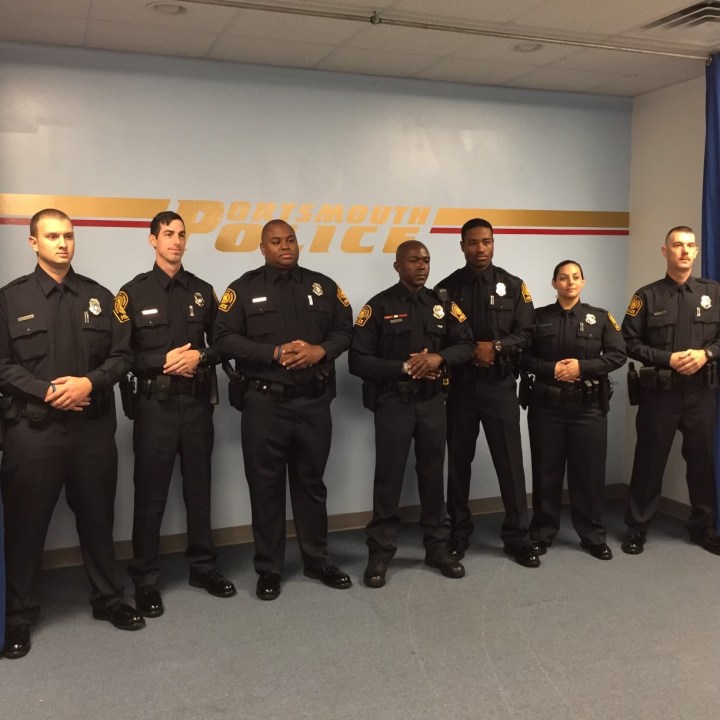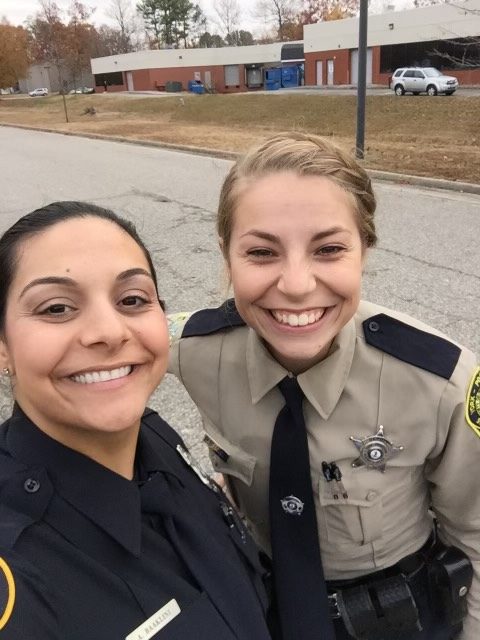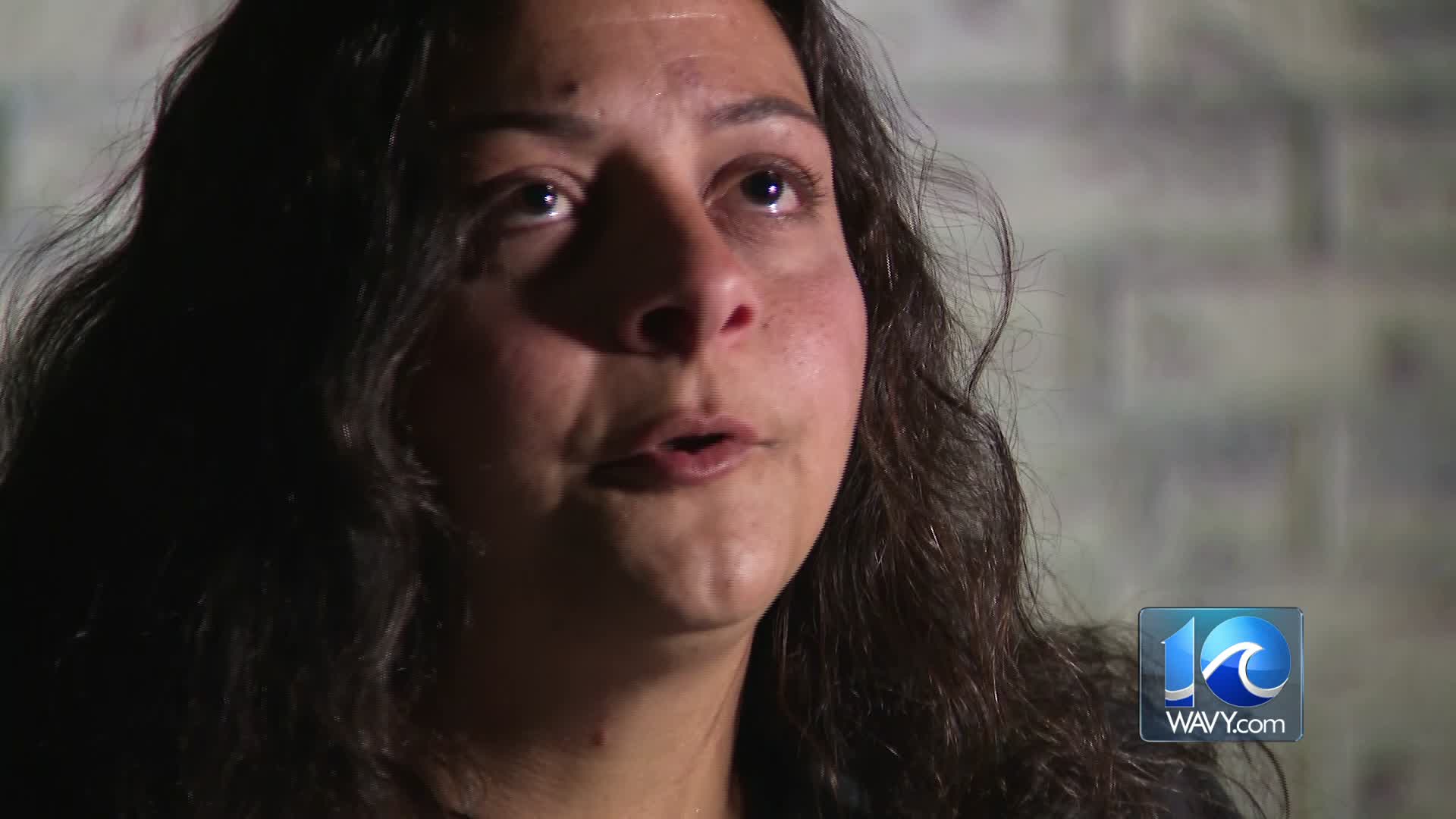PORTSMOUTH, Va. (WAVY) – When Angelina White was shot in the line of duty, she wasn’t the only person left with lasting scars.
“I’ve watched what my husband went through. My mother. My friends. People who were on the scene,” she said. “They all have their own share of guilt about what happened.”
White was a fresh-faced patrol officer just three months out of the Portsmouth Police Training Academy when she was shot by a teenager on Nov. 6, 2017. She survived, but the shooting ended her police career and left her physically and mentally traumatized.

“It’s a new life. I don’t get that old life anymore. I never get to be that person again,” she said. “No matter how hard you try or how much treatment you go through, you don’t get to go back.”
The shooter, Will Patterson, was just 15 years old. He was convicted of trying to kill White in 2018, but that verdict was overturned in 2020 when a judge agreed with the defense that Patterson was incompetent through all stages of the trial.
Patterson was convicted of attempted murder again in September and was sentenced to 88 years in prison in April. He declined an interview with 10 On Your Side for this story.
“I was satisfied with it,” White said of Patterson’s sentence. “I can’t tell you I’m happy or excited or anything like that. I can’t tell you that because I’m not. It doesn’t change anything, but what it does change is a chance for that community to be better, because they don’t deserve that, and he’s proven it over and over again.”
More than five years have passed since White was shot. She’s endured surgeries and therapy with the support of her husband, family, friends and the law enforcement community. She remained publicly silent about the shooting, except for testifying against Patterson at both of his trials. Now that he’s been sentenced, White decided to share her story with 10 On Your Side.
“I came here with the point today of being who I am and who I changed and have grown into,” White said. “Maybe it’ll reach somebody.”
Lasting scars
White was known as Angelina Baaklini when she first joined the Portsmouth Police Department. When she decided to go into law enforcement, her mom begged her to choose a different department in a safer city, but White felt called to Portsmouth and hoped to make it a safer community.
“I told her Portsmouth needed me,” she said.
A lot of blood was shed on the streets of Portsmouth the week before White’s shooting.
White was one of the officers on scene when 18-year-old Deontrace Ward was shot by Portsmouth Officer Jeremy Durocher. That shooting happened during an armed burglary in late October 2017. Ward got six years for the crime, but sued the city and was awarded a $200,000 settlement. Durocher was indicted on aggravated malicious wounding and use of a firearm charges. He’s currently awaiting trial.
Other shootings plagued the streets, too. White said a pregnant woman and her husband were shot on Morton Street. A person was injured when shots were fired during an offer-up robbery in Dale Homes. The morning of White’s shooting, she said someone tried to take out a hit on a Portsmouth police officer.
“The reason why I give you all these short, small incidents is because they’re all tied together,” she said.
White was eating Taquitos and drinking Mountain Dew with a friend just five minutes before she was shot. She didn’t know it then, but that snack would be among the last normal moments of her life.
She responded to a call for service for a runaway kid in the Mt. Hermon neighborhood. She spotted Patterson riding a stolen bicycle and knew who he was immediately. Patterson was admitted a member of the 300 street gang with a criminal record. His aunt listed him as a runaway, giving White a legal reason to pick him up and take him home.
She followed Patterson for about three blocks before he crashed the bike into her patrol car near Hickory Street and Phillips Avenue. She said Patterson was agitated as she started to detain him. She called for backup, but her radio was silent.
“Tensions were growing, and I went to put him in handcuffs, and I cuffed him, his left wrist,” she remembered. “He was faster. He grabbed his gun from inside of his waistband, reached over his shoulder, and shot me.”
Patterson fired six shots at the officer. Five of them hit White, including a bullet that penetrated her thigh and femoral artery.
“I screamed. I remember screaming once, and then I radioed for help. ‘Officer shot! Help!’ And one of my saviors, he ran out,” she said.
That savior was Geravis Brown, a retired law enforcement officer who lived nearby and saw part of the encounter from his window. He rushed to White’s aid and used her radio to continue calling for help.
Brown made White lay down and stay still as she bled out onto the pavement. Stay with me, he urged.
“I remember everything. I was awake for everything. I watched people work, people freeze over me in shock. The look in their eyes that there was a dying person on that asphalt,” White said.

Portsmouth officers did make it to the scene. As they tended to her wounds and put a tourniquet on her leg, White told them who’d shot her: Will Patterson. The teenager ran from the scene, but didn’t make it far. Police arrested him just moments later.
A surgeon would testify that White came within minutes of dying. She spent more than two weeks recovering in the hospital. She’s undergone several surgeries to save her leg and recently found out she’ll need another because of narrowing in the artery.
But it isn’t just her body that bears lasting scars – it’s her mind, too.
White has trouble with her short-term memory. There are days when her moods are up and down. She suffers from panic attacks. She struggles to sleep because of insomnia and night sweats.
Every week, she goes to a special type of therapy called eye movement desensitization and reprocessing (EDMR). It’s an intense experience that forces White to relieve the darkest moments of the shooting.
“A lot of it is figuring out how to live with it, but live with it the right way,” she said.
“You have to allow yourself to feel it,” she continued. “If you don’t, and you bottle it up, you will break one day or you will have a very miserable life.”
White still struggles to say the awful truth out loud: She’ll never be a police officer again.
“Every day I wish that I could go back,” she said.

Now, she watches law and order unfold from outside the system. Violent crimes happen. Arrests are sometimes made. Prosecutions are sometimes secured.
And while she’s thankful for the prosecutors who fought for justice for her, she’s keenly aware that there are other people who aren’t as fortunate – victims and their families who carry the lasting scars of gun violence, but who never have their day in court.
“There needs to be more of these types of punishments for these crimes,” White said. “Especially for those who get released and commit the crimes again and again. The cycle of violence has to stop and at the end of the day it is in the hands of the Commonwealth and judges.”

Extended interview with former Portsmouth Police Officer Angelina White
And while those lasting scars torn into White’s body and mind ache, her support system suffers, too. She said that each of them carries the burden of their own survivors guilt.
Her husband goes to work every day as a police officer. He wonders if he could have protected her if he’d just worked on the day of the shooting.
The friend White was eating with before the shooting wishes he’d responded to the call to Mt. Hermon with her. Maybe he’d have been able to deescalate Patterson’s arrest.
Her savior, retired Officer Brown, carries his own weight, too. The man who rushed to her aid and helped save her life lives with the memory of her screams – a sound he told her reminded him of screams from the war.
“Think about what this has done to him and his family,” White said. “Everybody carries their own weight. So when I said in court, it’s not just me – it’s everyone.”















